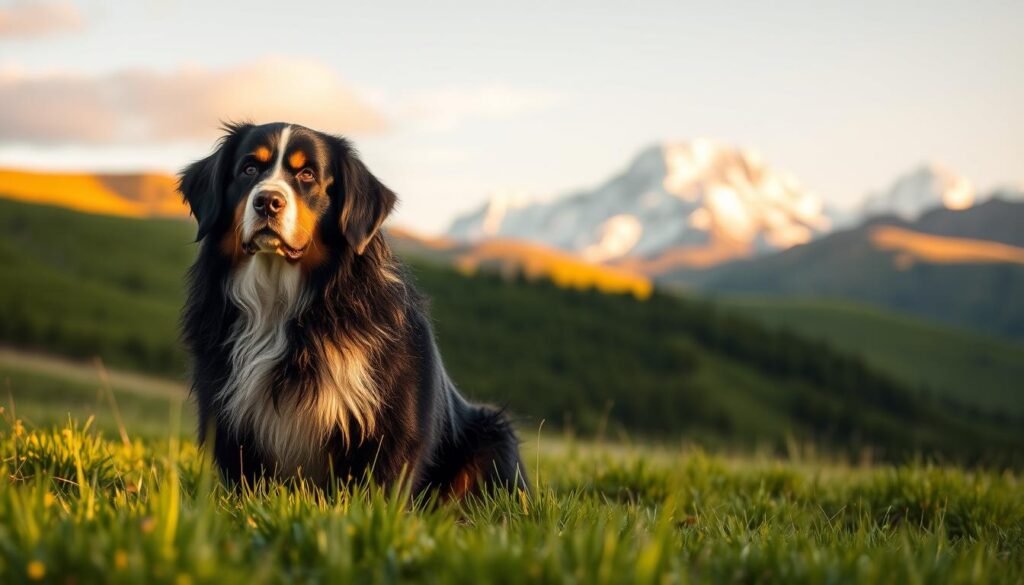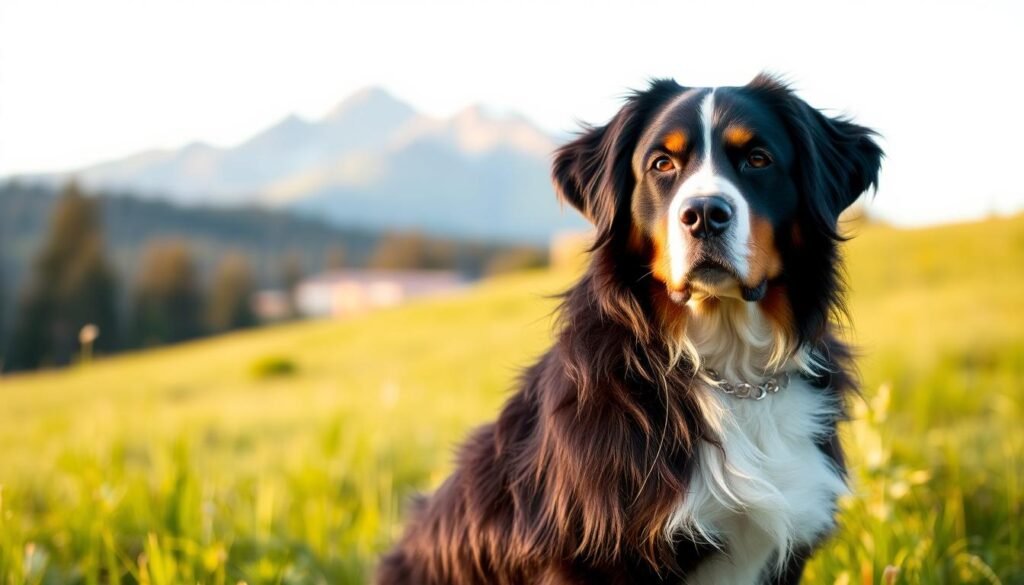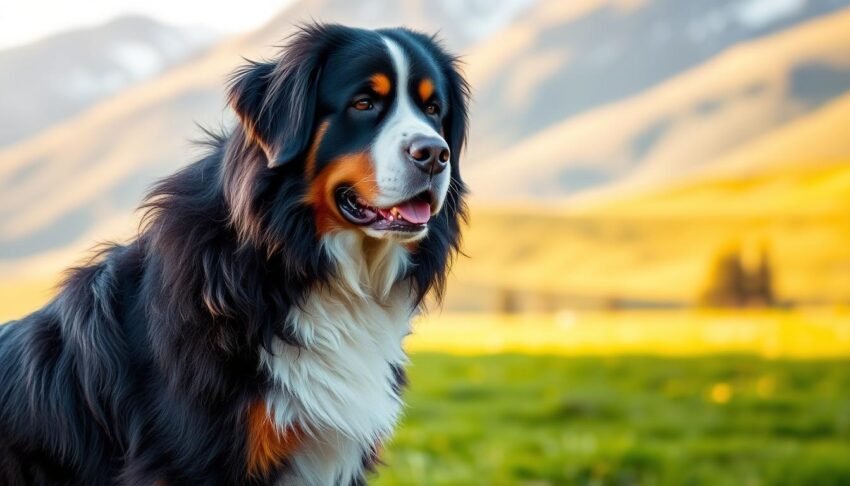The Bernese Mountain Dog, also known as the Berner, is a large, sturdy dog with a thick, tri-colored coat and a gentle, devoted nature, making them a great addition to many families, especially those looking for a breed from reputable Bernese Mountain Dog breeders1. With their origins in Switzerland, they were originally used as working dogs, and their size, coat, and personality make them a popular choice for many dog owners2. As you consider bringing a Bernese Mountain Dog into your life, it’s essential to understand their needs, including training, exercise, health, longevity, recognition, suitability, grooming, intelligence, adaptability, activity level, socialization, popularity, history, feeding, and weather conditions3.
Key Takeaways
- The Bernese Mountain Dog is a large, sturdy dog with a thick, tri-colored coat and a gentle, devoted nature.
- They require regular exercise, including at least one hour of daily activity, and need their coat brushed 2 to 3 times a week1.
- Early socialization is crucial for shaping the Bernese Mountain Dog’s well-adjusted demeanor, and they thrive with human interaction2.
- Regular veterinary check-ups are necessary to monitor their health, as they are prone to hip dysplasia, certain types of cancer, and other health issues12.
- With a lifespan of 7 to 10 years, it’s essential to consider the estimated lifetime cost of owning a Bernese Mountain Dog, which can be around $20,0003.
- Bernese Mountain Dogs are highly trainable and responsive to positive reinforcement techniques, making them a great choice for first-time dog owners3.
Overview of the Bernese Mountain Dog
The Bernese Mountain Dog is a large breed with a rich history, originating from the Canton of Bern in the Swiss Alps4. They were initially used as working dogs, pulling carts and guarding farms, which has contributed to their sturdy build and thick coat. As a result, they require regular Bernese Mountain Dog care, including a balanced diet and regular exercise to maintain their Bernese Mountain Dog size and overall health5.
One of the key characteristics of the Bernese Mountain Dog is their gentle and devoted Bernese Mountain Dog temperament, making them an ideal companion for families. They typically stand between 23 and 28 inches tall and weigh between 70 to 116 pounds at maturity5. Their thick coat requires regular grooming, and they need at least 30 minutes of exercise per day to stay healthy4.
History and Origins
The Bernese Mountain Dog has a long history, dating back over 2,000 years to Switzerland. They were one of four Sennehund or Swiss Mountain breeds and were first brought to the United States in the 1920s for farm work4. Today, they are recognized by the American Kennel Club and are used as therapy dogs, service animals, and family companions.
Physical Characteristics
Here are some key physical characteristics of the Bernese Mountain Dog:
- Weight range: 70 to 116 pounds5
- Height range: 23 to 28 inches tall5
- Coat: thick and dense4
- Exercise needs: at least 30 minutes per day4
Temperament and Behavior

As a potential owner, you’re likely wondering about the temperament and behavior of Bernese Mountain Dogs. With their gentle and devoted nature, they make great additions to families with children6. They are highly social and require regular socialization to prevent anxiety and fear-based behaviors. This socialization is crucial, as Bernese Mountain Dogs can be aloof with strangers7.
One of the key aspects of their behavior is their need for companionship. Bernese Mountain Dogs are known to be “very needy”7, indicating a high demand for attention and interaction. This, combined with their large size8, means they require regular exercise and training to manage their energy levels. Their average lifespan is around 7-10 years68, and they are prone to certain health issues, such as hip and elbow dysplasia6 and gastric dilatation-volvulus8.
In terms of grooming, Bernese Mountain Dogs are known for their high shedding frequency7, which requires daily brushing during shedding season8. Their coat care routine should include weekly brushing and monthly baths6. With proper training, socialization, and care, Bernese Mountain Dogs can thrive in a variety of living situations, making them a great choice for many families.
| Characteristic | Description |
|---|---|
| Affection Level | High6 |
| Friendliness | High6 |
| Kid-Friendly Rating | High6 |
| Exercise Needs | Medium, with a minimum of 30 minutes of moderate-intensity exercise daily6 |
Health Considerations for Bernese Mountain Dogs
As a potential owner of a Bernese Mountain Dog, it’s essential to be aware of the health considerations associated with this breed. Bernese Mountain Dog breeders and owners should be knowledgeable about the common health issues that can affect these dogs. According to statistical data9, Bernese Mountain Dogs are prone to certain health issues, such as hip dysplasia and elbow dysplasia, which can lead to degenerative joint disease and osteoarthritis10. Regular veterinary checkups are crucial to stay on top of their health and prevent any potential issues from becoming major problems.
Some of the common health issues that can affect Bernese Mountain Dogs include cancer, autoimmune disorders, and allergies9. It’s also important to note that Bernese Mountain Dogs are at risk for Gastric Dilatation-Volvulus (GDV) and hip dysplasia, which can cause pain and limping10. To reduce the risk of these health issues, it’s essential to work with a reputable breeder who prioritizes the health and well-being of their Bernese Mountain Dog puppies.
When it comes to caring for your Bernese Mountain Dog, regular grooming is necessary due to heavy shedding, which occurs year-round but increases during seasonal changes10. Bathing is recommended every 2 to 4 weeks for skin and coat health maintenance. Additionally, providing a balanced diet that includes proper amounts of fat, protein, and carbohydrates is vital for steady growth and preventing weak bones or joints11. By being aware of these health considerations and taking proactive steps, you can help ensure that your Bernese Mountain Dog lives a long and healthy life.
It’s also important to note that Bernese Mountain Dog breeders and owners should prioritize health testing and genetic disease screening to reduce the risk of inherited health issues9. By working together, we can promote the health and well-being of this beautiful breed and ensure that Bernese Mountain Dog puppies grow into happy and healthy adult dogs.
Training Your Bernese Mountain Dog

As a Bernese Mountain Dog owner, providing proper training is essential to ensure your dog becomes a well-behaved and loyal companion. Bernese Mountain Dog care involves understanding their intelligence and responsiveness to positive reinforcement training12. With patience and consistency, you can help your dog thrive in various living situations. When it comes to Bernese Mountain Dog size, it’s essential to consider their weight, which typically ranges from 70 to 115 pounds13.
Training sessions should be engaging and rewarding, using treats and praise to motivate your dog12. Breaking treats into smaller pieces can extend training sessions and maintain your dog’s interest12. A clicker or audible marker like “YES” can be used to indicate correct behavior during training12. By following these tips, you can enhance your dog’s understanding and retention of commands.
Obedience Training Tips
- Daily practice is recommended to enhance training effectiveness for Bernese Mountain Dogs12.
- Using treats as a reward is essential for motivation; they should be soft and highly appealing12.
- Frequent practice with training commands can lead to quick learning; dogs may pick up on new commands faster with repetitive training12.
Socialization Strategies
Socialization is crucial for Bernese Mountain Dogs to prevent anxiety and fear-based behaviors. By exposing your dog to various environments and people, you can help them become confident and calm in new situations. Remember to always prioritize your dog’s comfort and safety during socialization sessions.
Exercise Requirements
As a Bernese Mountain Dog owner, it’s essential to understand the exercise requirements of your pet to ensure they stay healthy and happy. Bernese Mountain Dog temperament plays a significant role in determining their exercise needs, as they are bred to be working dogs and require regular physical activity. Daily walks and playtime are crucial to keep them physically and mentally stimulated, and their Bernese Mountain Dog shedding can be managed with regular grooming and exercise.
According to research, Bernese Mountain Dogs require at least 1 hour of exercise daily, ideally split into two or more sessions14. This can include activities such as hiking, swimming, and playing fetch. It’s also important to note that excessive exercise can cause damage to bones, muscles, and joints, especially during the first 2-3 years of their life14. As they age, Bernese Mountain Dogs typically become less active, but some may remain active into their senior years14.
Here are some fun activities to engage your Bernese Mountain Dog:
- Playing fetch or tug-of-war
- Going on hikes or long walks
- Swimming or playing in the water
- Pulling a cart or sled
These activities can help manage health problems, such as arthritis, and minimize the risk of obesity associated with the breed14. Additionally, a minimum daily exercise requirement of 30 minutes is recommended, with an ideal duration of over 1 hour15.
It’s also important to consider the breed’s sensitivity to heat and potential for overheating in warm or humid weather15. With proper exercise and care, Bernese Mountain Dogs can thrive and enjoy a happy and healthy life, and their Bernese Mountain Dog temperament will shine through.
| Age | Exercise Needs |
|---|---|
| Puppies (0-2 years) | Short, gentle walks and playtime |
| Adults (2-7 years) | At least 1 hour of exercise daily, split into two or more sessions |
| Seniors (7+ years) | Short, gentle walks and playtime, with reduced frequency and intensity |
By understanding the exercise requirements of your Bernese Mountain Dog and providing them with regular physical activity, you can help manage their Bernese Mountain Dog shedding and ensure they lead a happy and healthy life16.
Nutrition for Bernese Mountain Dogs
When it comes to feeding your Bernese Mountain Dog, it’s essential to provide a balanced diet that meets their nutritional needs. Bernese Mountain Dog breeders recommend a high-quality dog food that includes protein and complex carbohydrates. The recommended protein level for Bernese Mountain Dogs is approximately 18-26%17. A good quality dog food should also have a fat content of under 16%17. Bernese Mountain Dog puppies require a nutrient-rich diet to support their growth and development.
A healthy Bernese Mountain Dog should be fed between 3-6 cups of good quality food daily17. Puppies, on the other hand, require more frequent meals. Young puppies (2-6 months) should be offered 3 meals per day, while older puppies can transition to 2 meals per day17. It’s also important to note that food intake generally increases as the puppy grows17.
In addition to a balanced diet, supplements and treats can be beneficial for Bernese Mountain Dogs. Some supplements, such as ProDog Muscle+, contain high-quality protein and can support healthy muscle development18. Others, like ProDog Flexx, include ingredients that enhance joint comfort and flexibility18. When choosing supplements and treats, it’s essential to consult with a veterinarian to determine the best options for your Bernese Mountain Dog.
By working with a reputable breeder and consulting with a veterinarian, you can determine the best diet for your Bernese Mountain Dog. A well-balanced diet, combined with regular exercise and proper care, can help ensure that your Bernese Mountain Dog leads a happy and healthy life. Bernese Mountain Dog breeders and owners can benefit from learning about the nutritional needs of their dogs to provide the best possible care.
| Age | Food Intake | Meal Frequency |
|---|---|---|
| 8-10 weeks | 3/4 – 1.5 cups per meal | 3 meals per day |
| 2-6 months | increases as puppy grows | 3 meals per day |
| after 6 months | 3-6 cups per day | 2 meals per day |
Grooming Your Bernese Mountain Dog
As a Bernese Mountain Dog owner, it’s essential to understand the importance of regular grooming to prevent matting and tangling of their thick, tri-colored coat19. This breed requires a coat care routine that includes regular brushing, bathing, and shedding tips to keep their coat healthy and looking its best. The Bernese Mountain Dog size can vary, but their coat care needs remain consistent20.
A well-structured grooming routine should include daily brushing, with a focus on removing matting, particularly in areas prone to tangling, such as behind the ears and around the ruff19. Bathing should be done regularly, ideally once a month, and nail trimming should occur every four to six weeks21. The right grooming tools, including slicker brushes, wide-toothed combs, and undercoat rakes, are crucial for effective grooming19.
Regular grooming not only helps maintain the health and appearance of your Bernese Mountain Dog’s coat but also strengthens the bond between you and your dog20. It’s essential to start grooming habits early in a puppy’s life to ensure long-term acceptance of grooming routines20. By following a consistent grooming routine and using the right tools, you can help keep your Bernese Mountain Dog’s coat healthy, shiny, and well-maintained, which is a critical aspect of Bernese Mountain Dog care21.
| Grooming Tool | Description |
|---|---|
| Slicker Brush | Used for removing tangles and matting |
| Wide-Toothed Comb | Used for detangling and smoothing the coat |
| Undercoat Rake | Used for removing loose hair and preventing shedding |
By following these grooming tips and using the right tools, you can help keep your Bernese Mountain Dog’s coat healthy and well-maintained, which is essential for their overall health and well-being19.
Living Arrangements for Bernese Mountain Dogs
When it comes to living arrangements, Bernese Mountain Dogs are adaptable to a variety of situations, from apartments to homes with large yards22. However, they do require regular exercise and attention to stay happy and healthy. Their Bernese Mountain Dog temperament is such that they thrive on interaction and activity. Considering their space requirements, it’s essential to provide them with a comfortable and spacious home environment.
A key aspect of their living arrangements is managing their Bernese Mountain Dog shedding, which can be significant due to their double coat22. Regular grooming is essential to prevent matting and reduce shedding. Additionally, their thick coat requires maintenance to prevent overheating in warm conditions, making them more suited to colder climates22.
Some important factors to consider when creating a suitable living arrangement for your Bernese Mountain Dog include:
- Providing regular exercise, such as daily walks, to keep them physically and mentally stimulated22
- Creating a comfortable and spacious home environment that meets their space requirements22
- Managing their shedding through regular grooming and maintenance22
- Ensuring they receive adequate attention and interaction to support their Bernese Mountain Dog temperament22
By understanding the needs of your Bernese Mountain Dog and creating a suitable living arrangement, you can help ensure they thrive and become a beloved and integral part of your family23.
Travel and Outdoor Adventures
As a Bernese Mountain Dog owner, you’re likely eager to share your love of travel and outdoor adventures with your furry companion. With their gentle and affectionate nature, Bernese Mountain Dogs make excellent travel buddies. When preparing for travel, it’s essential to consider your dog’s needs and plan accordingly. Many Bernese Mountain Dog breeders recommend acclimating your dog to their carrier or crate before embarking on a trip24.
Some popular dog-friendly locations include hiking trails, dog parks, and pet-friendly beaches. According to statistics, approximately 30% of dog owners in the U.S. frequently travel with their pets, and 60% of outdoor enthusiasts own a dog25. When traveling with your Bernese Mountain Dog, be sure to research dog-friendly accommodations and plan for regular breaks and exercise. Many Bernese Mountain Dog puppies require regular grooming, which can be a challenge when traveling, but with the right preparation, you can ensure a fun and stress-free trip for both you and your dog25.
Some tips for traveling with your Bernese Mountain Dog include:
- Packing plenty of food, water, and treats
- Bringing your dog’s favorite toys and blankets
- Researching dog-friendly attractions and activities
By following these tips and planning ahead, you can create lasting memories with your Bernese Mountain Dog and enjoy many exciting travel and outdoor adventures together.
Adopting a Bernese Mountain Dog
Welcoming a Bernese Mountain Dog into your family is a decision that requires careful consideration and research26. Finding a reputable breeder is crucial, as they prioritize the health and well-being of their dogs26. When adopting a Bernese, you need to be prepared for the responsibilities of dog ownership, including providing regular exercise, training, and veterinary care27.
With the right preparation and a loving environment, you can enjoy a lifetime of companionship and joy with your Bernese Mountain Dog26. These gentle giants make wonderful family pets, known for their affectionate nature and loyalty27. By considering the size27, exercise needs27, and potential health concerns26, you can ensure a successful and rewarding adoption experience.
FAQ
What is the history and origin of the Bernese Mountain Dog?
What are the physical characteristics of the Bernese Mountain Dog?
What is the temperament of the Bernese Mountain Dog?
What are the common health issues associated with Bernese Mountain Dogs?
How should I train a Bernese Mountain Dog?
How much exercise do Bernese Mountain Dogs need?
What should I feed a Bernese Mountain Dog?
How much grooming do Bernese Mountain Dogs require?
What type of living environment is best for a Bernese Mountain Dog?
Can I travel with a Bernese Mountain Dog?
How do I find a reputable Bernese Mountain Dog breeder?
Source Links
- Bernese Mountain Dog: Discover This Loyal and Affectionate Dog – https://www.invoxia.com/blog/petcare/dog-breed-bernese-moutain-dog/
- Discover Bernese Mountain Dogs – Traits, Care, History – https://felicitails.com/blogs/about-dog-breeds/the-bernese-mountain-dog-breed?srsltid=AfmBOorbqAIUjvxyuxYuVThRoTmwZ7XIz27OFR2CTgiPCNULTskURz1R
- Bernese Mountain Dogs: The Good, the Bad, and the Ugly – https://figopetinsurance.com/blog/bernese-mountain-dog-breed-guide
- Bernese Mountain Dog Information & Characteristics – https://dogtime.com/dog-breeds/bernese-mountain-dog
- Bernese Mountain Dog Facts, History & Health – https://www.trupanion.com/pet-blog/article/bernese-mountain-dog
- The Loyal and Friendly Bernese Mountain Dog – https://www.thesprucepets.com/bernese-mountain-dog-4427890
- Reasons You Should NOT To Get A Bernese Mountain Dog — Kevin The Berner – https://www.kevintheberner.com/blog/6-reasons-not-to-get-a-bernese-mountain-dog
- Bernese Mountain Dog | Description, Temperament, Images, & Facts | Britannica – https://www.britannica.com/animal/Bernese-mountain-dog
- Bernese Mountain Dog Health-Overview – http://www.bmdinfo.org/bernerpedia/Bernese_Mountain_Dog_Health-Overview.php
- Bernese Mountain Dog – https://www.petmd.com/dog/breeds/bernese-mountain-dog
- 6 Health Issues to Watch for in Bernese Mountain Dogs | Spot® – https://spotpet.com/blog/breed-tips/6-common-bernese-mountain-dog-health-problems
- Train Your Bernese Mountain Dog Puppy To Sit — Kevin The Berner – https://www.kevintheberner.com/blog/7-easy-steps-to-train-your-dog-to-sit
- No title found – https://www.akc.org/expert-advice/advice/train-bernese-mountain-dog-puppy-milestone-timeline/
- How Much Exercise Do Bernese Mountain Dogs Need? Vet-Approved Advice – Dogster – https://www.dogster.com/dog-health-care/how-much-exercise-do-bernese-mountain-dogs-need
- Bernese Mountain Dog – https://www.orvis.com/bernese-mountain-dog.html?srsltid=AfmBOooLqp5XowEBOfsqsXevWwhNYqfsuAPtG1-M2Nr0H6m_FXBTaViK
- Bernese Balance: Tailoring the Perfect Diet and Exercise Plan for Your Bernese Mountain Dog – Dress Up Your Pup – https://www.dressupyourpup.com/bernese-balance-tailoring-the-perfect-diet-and-exercise-plan-for-your-bernese-mountain-dog/?srsltid=AfmBOorLvI4_V_WvHK21Jzuom7ywMbjT4rD5Ly-C295rUamxxR_J9QSc
- Dog Food Feeding Berner Puppies and adults – http://www.bmdinfo.org/bernerpedia/Dog_Food_Feeding_Berner_Puppies_and_adults.php
- Bernese Mountain Feeding Guide – https://www.prodograw.com/raw-feeding-guide/bernese-mountain-feeding-guide/
- How to Groom a Bernese Mountain Dog – https://www.groomersu.com/blog/how-to-groom-a-bernese-mountain-dog
- Bernese Breeders Association of Great Britain – https://bernesebreeders.chessck.co.uk/GroomingYourBernese
- Care for Bernese Mountain Dogs, brushing, bathing, and haircuts – https://artero.com/usa/petcare/breeds/bernese-mountain-dog
- Owning a Bernese Mountain Dog – https://www.blueridgebmdc.org/owning-a-bernese-mountain-dog.html
- 5 Great Large Dog Breeds for Families – https://www.countryhillspets.com/services/dogs/blog/5-great-large-dog-breeds-families
- Bernese Mountain Dog: Love & Heartache | Dabbling & Decorating – https://www.dabblinganddecorating.com/love-and-heartache-with-a-bernese-mountain-dog/
- A Berner at Home: The Perfect Family Pet, the Bernese Mountain Dog ~ White Arrows Home – https://whitearrowshome.com/a-berner-at-home-the-perfect-family-pet-the-bernese-mountain-dog/
- Adopting a Berner | berner-inc – https://www.bernerinc.org/adopting-a-berner
- Bernese Mountain Dog & Puppy Breed and Adoption Info – https://www.petfinder.com/dogs-and-puppies/breeds/bernese-mountain-dog/


